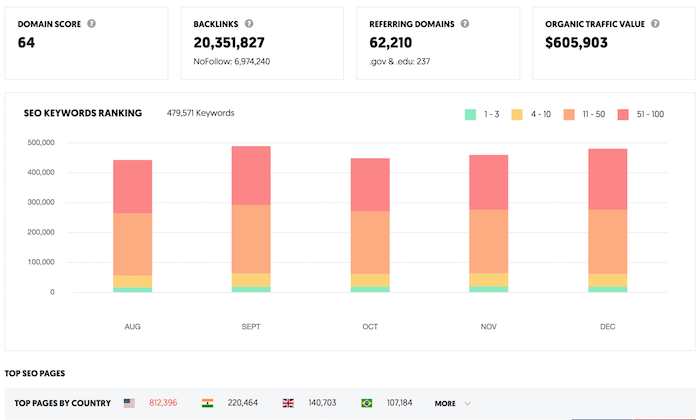
In 2018, I promised you I would release a better version of Ubersuggest for free, and I did that.
But there was one big issue: Ubersuggest only worked on a keyword level. When you put in a keyword, you get a list of more keyword ideas and content ideas.
And then when you put in a URL, nothing happened.
Well, that was before.
You can now get domain level metrics!!!!
So let’s dive into the new Ubersuggest.
Traffic Analyzer Overview
The traffic analyzer is broken down into 3 main sections: overview, top pages, and keywords.
The overview looks like this:

The first section breaks some basic stats and a graph of the domain’s search traffic.
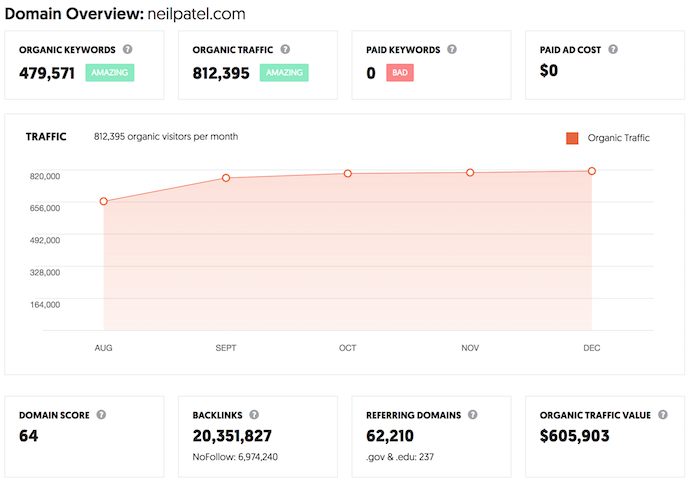
As you can see from the screenshot above, you’ll see how many keywords a domain ranks for, the total estimated search traffic from that region, the number of paid keywords a site is bidding on, and how much they are spending on Google Ads.
In addition to that, you’ll see a traffic graph that shows estimated search traffic a site receives over time.
And of course, a domain level overview won’t be complete without data such as backlinks, referring domains, the number of .edu and .gov links, and how much the organic traffic is worth if you had to pay for it.
Now, before you head over to Ubersuggest and type in a domain, there is one thing you need to keep in mind… Ubersuggest treats subdomains as a separate site. So if you enter in store.nike.com you will get different results than if you typed in nike.com. By typing in nike.com, you would NOT see any of the data from their store unless you typed in store.nike.com.
We did this on purpose as it allows you to analyze sites more thoroughly.
Also, within the traffic analyzer, you’ll see bar graphs that contain the overall positioning of the keywords you rank for over time.
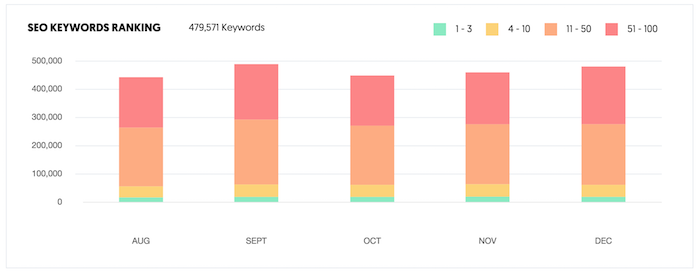
The chart above shows how many keywords a domain ranks for that are in the top 3 positions in Google, the top 10 positions, the top 50 positions, and the top 100 positions.
You already know no one clicks beyond page one, but over time you’ll want to see your site climbing the ranks. Hence, we track how many keywords are ranking in the first 100 positions.
Now let’s get into my favorite feature of the traffic analyzer.
Top SEO Pages
The second part of the traffic analyzer is a list of the most popular pages for a given domain.
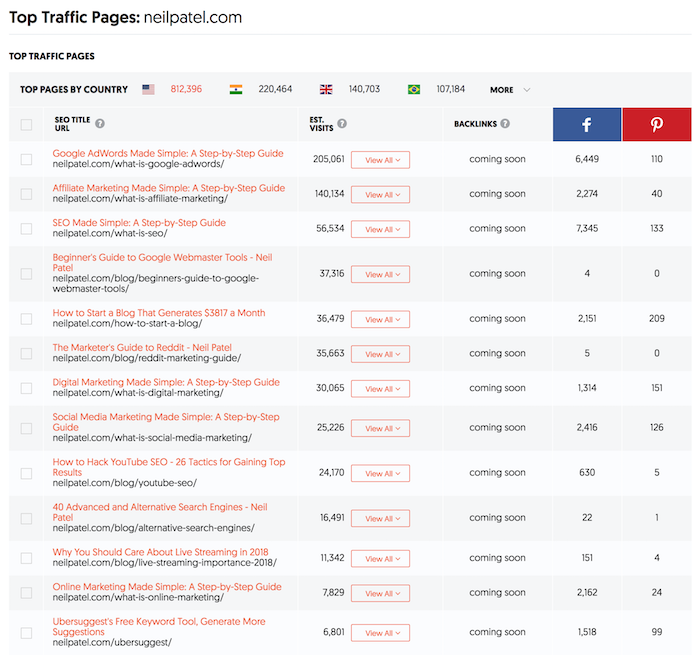
For each page, you are given the title, URL, the number of visits a page receives from Google on a monthly basis, and the number of times the URL has been shared on the social web.
My favorite part about the top SEO pages report is when you click on “view all” you’ll see a list of keywords a page ranks for.
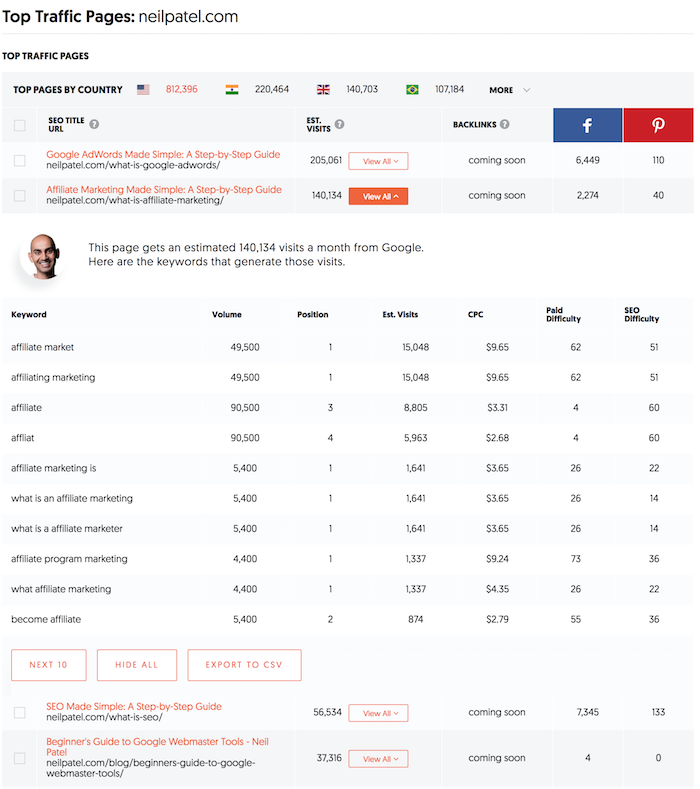
This one report will not only list out each keyword a webpage ranks for, but the position, estimated visits, cost per click data if you paid for that keyword, and how difficult it would be to rank for it.
What I love about this report is that I can put in a competing URL and see what’s working really well for my competition and then copy them. Or even better, create a more in-depth page than my competition.
Plus, if you have clients who are global, you can click on the flag at the top and see the top pages for any domain in all of the major countries.
For example, here are my most popular pages in Brazil.
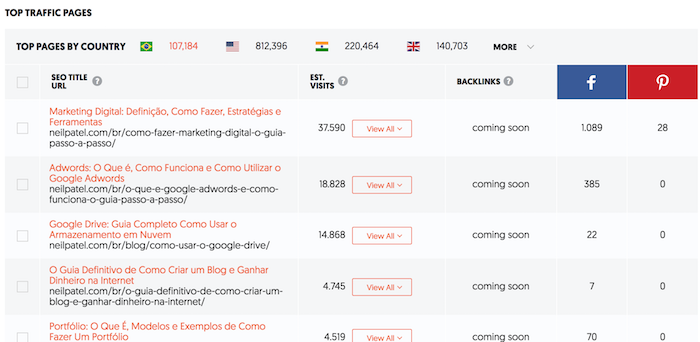
Top Keywords
The last section in the new Ubersuggest is top keywords.
Whether you put in your own domain or competitors, you’ll be able to see all of the organic keywords and paid keywords a site is going after.
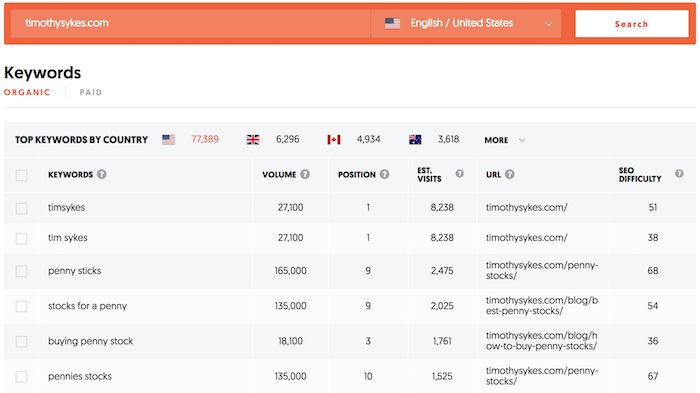
When you click on the “paid” button you’ll see the list of paid keywords as well.
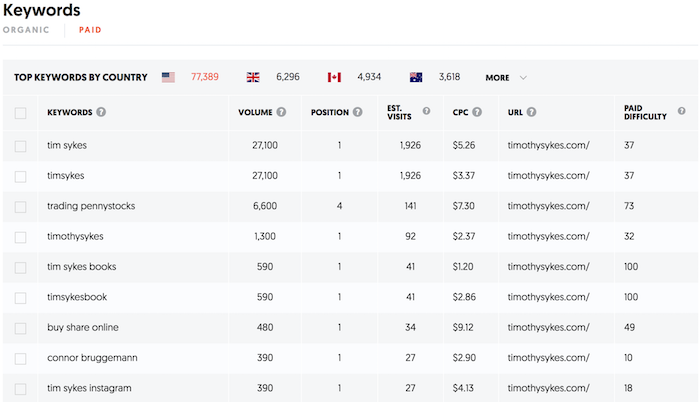
And just like the keyword research reports within Ubersuggest, you’ll have data on URLs, paid difficulty and SEO difficulty.
Conclusion
I hope you enjoy the new version of Ubersuggest. I know there are still some bugs in which the reports don’t load as fast as you want (Top SEO Pages can take up to 20 seconds to load) and you may have to clear your cache to see the new features, but hopefully, you enjoy the updates.
There are also some issues with duplicate keywords and misspellings. The engineering team is continually looking to fix this.
We do know there are many issues with duplicate keywords and misspellings in our Japan database, but we are working on fixing this as soon as possible.
So overall, I know it’s not perfect, but what do you think so far?
And if you haven’t tried it, head over to Ubersuggest and type in a domain.
PS: If you find any bugs, please email carlos@neilpatel.com
The post The Ultimate SEO Tool: Ubersuggest 3.0 appeared first on Neil Patel.
source https://neilpatel.com/blog/ubersuggest-3-0/
No comments:
Post a Comment